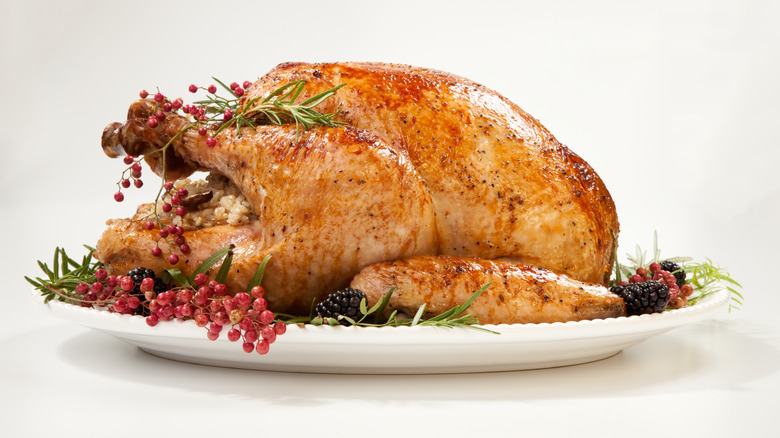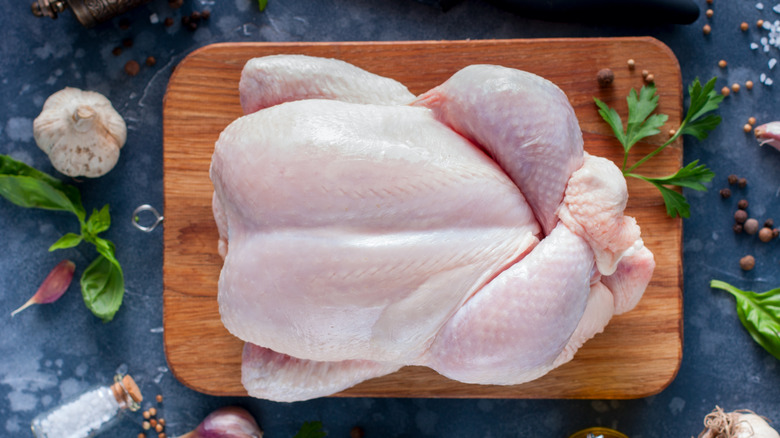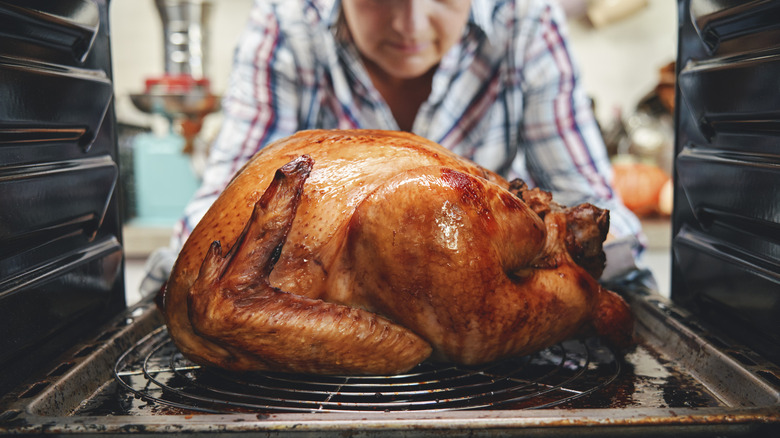What Are The Requirements For A Turkey To Be Considered Kosher?
Let's talk turkey. For Jews who adhere to a kosher diet, finding the right bird for your Thanksgiving feast can sometimes be a challenge. Meat departments in large grocery chains are unlikely to meet kashrut requirements, and independent butchers, even kosher ones, must be thoroughly vetted. Whether you keep kosher yourself or host kosher guests for dinner, you need to be clear on how the law applies to turkey. Unfortunately, that isn't entirely clear.
The Torah is explicitly clear about most kosher laws, but not when it comes to fowl. Deuteronomy 14 states, "You may eat any pure bird," but it doesn't actually define what a pure bird is. It does list a number of birds that are forbidden from consumption, including eagles, vultures, ravens, owls, hawks, and, interestingly enough, bats. The text isn't clear about whether every bird not listed is kosher, and crucially, many birds eaten today were not known in the Middle East at the time of its writing.
Turkeys are native to the Americas and weren't brought to the Eastern hemisphere until the 1500s, so the Torah obviously doesn't mention them. Instead, the turkey had to be judged against the forbidden birds listed in the Torah to determine its kosher status. It took a couple of centuries, but eventually, the general consensus became turkeys are kosher. However, they must be slaughtered and prepared according to specific guidelines.
The key requirements for kosher turkey
The Torah leaves a lot of gaps in its definition of kosher fowl, but guidelines later established by the Mishnah do their best to fill them. It gives four requirements for judging poultry. First, it must not be a bird of prey. Furthermore, it must have the following three features: An "extra toe" (referring to the hind toe seen on many birds' feet), a crop (a particular digestive organ), and a gizzard lined with easily peelable skin. Since turkeys meet all these requirements, they are generally considered kosher. But they must be raised and processed in a certain way.
Kosher turkeys are raised in a free-range environment, receiving a grain-based diet and no antibiotics. According to kosher law, they must be slaughtered by a trained shochet under rabbinical supervision. After the slaughter, the bird must immediately be salted or placed in a brine to draw out its blood. This not only meets kosher requirements but also has a significant culinary impact. Kosher turkeys are distinct in both flavor and texture, and understanding how to make the most of these traits is crucial if you want to plate up the perfect bird.
Kosher turkey needs to be treated differently in the kitchen
Kosher turkeys come with both advantages and drawbacks. Salting the bird ahead of cooking has a significant impact on its flavor and texture. Salt breaks down some of the proteins in the meat, which tenderizes and helps it retain more moisture. Turkey is notorious for drying out, putting a damper on what should be one of the best meals of the year, but kosher turkeys are known for avoiding this pitfall. Plus, because they retain more juice, they are more flavorful than a typical non-kosher turkey. Even people who aren't kosher sometimes seek them out for their superior succulence.
Another upside is that kosher turkeys are harder to overcook due to their high moisture levels, which means you don't need to panic if you miss the cooking time by a bit amid the kitchen chaos that inevitably comes with Thanksgiving (and if things really get away from you, there are ways to fix your overcooked Thanksgiving turkey).
Salting also presents some challenges. Pre-treating a turkey with salt can impart a faintly metallic flavor. It also means that you can't control the saltiness, and you need to be extremely careful about seasonings. Do not add more salt to a kosher turkey, and do not do a home brine ahead of cooking. This is important not only for flavor but also for people on low-sodium diets. For more tips on buying kosher, check out our guide to shopping for kosher meat.


